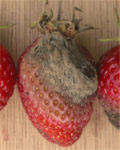 Shelly Batts had the good sense to read the entire article instead of just the abstract. Her analysis in Retrospectacle is, therefore, much more valuable than mine. Turns out the berries are only exposed to the fumes of the tested compounds. Her summary of the article is an easy read, and includes a helpful chart and graph. She says 60% of untreated blackberries rotted, 47% of ethanol-trated blackberries rotted, and only 29% of allyl isothiocyanate-treated blackberries rotted.
Shelly Batts had the good sense to read the entire article instead of just the abstract. Her analysis in Retrospectacle is, therefore, much more valuable than mine. Turns out the berries are only exposed to the fumes of the tested compounds. Her summary of the article is an easy read, and includes a helpful chart and graph. She says 60% of untreated blackberries rotted, 47% of ethanol-trated blackberries rotted, and only 29% of allyl isothiocyanate-treated blackberries rotted.
Thursday, April 26, 2007
More on Berries, Antioxidants and Alcohol
Posted by
Family Nutritionist
at
4/26/2007 02:02:00 PM
0
comments
![]()
![]()
Labels: alcohol, antioxidants, berries, journalism
Wednesday, April 25, 2007
Major News Outlets Misrepresent Food Study
Well, that sounds sensationalist, doesn't it? As Five Wells pointed out, it all started with "Fruity cocktails count as health food, study finds" in Reuters' Oddly Enough section. No matter that the piece completely misrepresents research published in the Journal of the Science of Food and Agriculture. It is merely entertainment on par with "Drunk deposits horse in bank for night."
The nonsense was picked up as "Cocktails are good for you!" in a Manchester Evening News blog. The blogger has got it as wrong as Reuters did, but it's still not hard news, so that doesn't really count, does it?
Somehow, though, this piece has been promoted from "a bit of a laugh" to "news"
- CNN has it in Diet and Fitness as Fruity cocktails count as health food, study finds
- MSNBC has it in Health and Fitness as Alcohol may make fruit more fruitful
- Some NBC affiliates have run it as Alcohol-Soaked Strawberries Pass the Test
- Even Medical News Today put it on their front page, as well as in Nutrition/Diet News as Are Strawberry Daiquiris The Extra-Healthy Cocktail?
- A quick internet search on "fruit alcohol" will pull up more examples from US newspapers and television news websites than you can shake a stick at.
Anybody who had read the abstract of the research article would know that the researchers were investigating how various preparations, when applied to whole berries, can help prevent decay during storage at 10 °C (approximately 50 °F). After a week or two, treated fruits were in better shape than untreated fruits.
The conclusion seems to be that spraying berries with ethanol or one of several other anti-fungal preparations helps prevent decay. There is correlation with the fact that, after a week or two, these old but not-very-rotten fruits have higher levels of anti-oxidants than the untreated, rotten fruits.
At no time do the researchers compare just-treated berries with freshly-picked, untreated berries. They do not claim that dipping the berries in alcohol will instantly boost their antioxidants. They certainly do not advocate the drinking of strawberry daiquiri.
The earliest instance I have found of a news organization following up on the pros and cons of drinking alcoholic fruit drinks is Alcohol 'makes fruit healthier' from the BBC. They do repeat the nonsense that this study suggests that "having [berries] in a cocktail may make them even healthier", but did get a quote from a registered dietician pointing out that any health benefits would be outweighed by the damage done by drinking all that alcohol. Other news organizations, such as ChinaDaily (Fruit's healthier if you mix it with alcohol) and The Register (Alcohol boosts health benefit of fruit) seem to have picked up on the ever-so-slightly more nuanced BBC article.
When I do a web search for "fruit" or "strawberries" or "berry" paired with "alcohol" at nytimes.com, philly.com, or washingtonpost.com, I do not find this article. Are the journalists there better trained to check their sources, find experts to clarify confusing jargon, even email the principal contact listed right at the top of the article?
As for all of the other news organizations -- if we can't count on them to check for accuracy in reporting, aren't they just wasting our time?
Read all of "Major News Outlets Misrepresent Food Study" ...
Posted by
Family Nutritionist
at
4/25/2007 09:23:00 PM
2
comments
![]()
![]()
Labels: alcohol, antioxidants, berries, journalism



